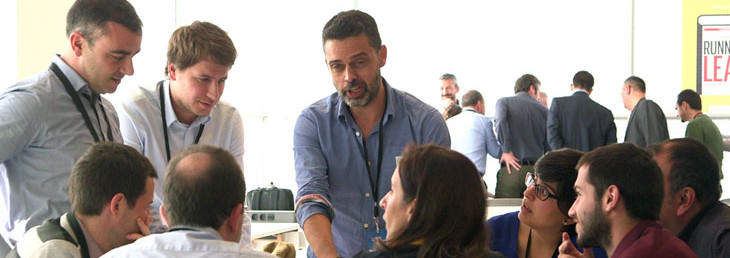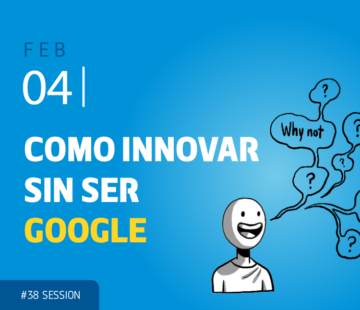We turned 25 learning how to act like a startup

Startups have been defined as a “mental state”, places pulsating with “high energy” where passion creates highly-motivated employees; a place where working with creative solutions that produce uncertain results is an accepted risk. Nowadays, traditional companies also want a bit of that energy. That’s why acting like a startup has become a popular goal in a growing number of large, well-established businesses and organizations. The current economic context forces their hand. Due to complex and rapidly changing markets, the need for a more agile and dynamic workflow becomes apparent. However- can it be done? Can consolidated businesses simultaneously enjoy the benefits of two different “operating systems”?
This is the question we tried to answer in our 25th Co-Session. On this occasion, we were hosted by AGBAR-SUEZ (Sociedad General de Aguas de Barcelona) in their new headquarters. Coinciding with their move into a brand-new building they have decided to rethink the way they work. The first step was eliminating over 400 offices and using modular structures to open up each floor and facilitate collaborative spaces.
But, ….what is a startup?
Before we go any further, what is a startup, exactly? In order to discuss how well-established companies can, or should, try to emulate them, perhaps we need to establish the distinguishing criteria. How do we define what makes a company a startup? It’s not easy. There are a multitude of varying definitions, from different points of view, as the founder of Co-Society Alfons Cornella revealed.
Contrary to what many might assume, company size isn’t necessarily a defining element. Startups don’t have to have a technology-based value proposal, either. However, there does seem to be a general consensus that they have the potential or need for quick growth as well as ambitious goals, while also being agile and flexible enough to change their objectives or the way they go about achieving them.
Perhaps the best way to find these defining traits would be to survey some startups themselves. Co-Society did so, polling over 50 startups, and showing the results to the participants of this Co-Session. Startups believe that their main defining feature is their passion; they think their success is due to the commitment and talent of the founders and the rest of the team. They define success as the opportunity to attain the resources necessary to invest in a new project.
And…How is a startup organized?
Besides polls, this Co-Session also included direct testimonies from both executives and founders regarding their experience turning a startup into a successful business. Alex Castellarnau, Design Director of Dropbox, said that there are two main defining characteristics for this type of new business: ambition and a global mission that can attract talent. To achieve both, it is absolutely necessary to recruit the best people, defined by Alex as those who combine being highly proactive, critical and able to implement ideas.
David Massó, CEO and co-founder of Promofarma, also shared his list of success factors for a startup. Surprisingly perhaps, the actual idea, or value proposal, comes third on his list, followed by the business model and the funding capacity. David considers good timing- launching at exactly the right time and not too early or too late-to be the top success indicator, and the team and idea execution to be the next most important. He believes you have to be sufficiently flexible when executing the idea to adapt to changes as they come up, and the team must avoid the “Golum Entrepreneur Syndrome” obsessing over “my precious” without giving credit to other points of view, opinions or even external signs.
Three-way debate: How to grow a startup without losing agility
More direct testimonies from startup executives followed. This time, the format was a debate and Mar Alarcón (Social Car) and Toni Brey (Urbiotica) were chosen to take part in the discussion. The third participant was from CAF Group, an organization with more than a hundred years of history. Jokin Lopetegui, however, is currently the director of CAF Ventures, where he is in direct contact with a varied ecosystems of startups related to railway transport systems.
There were agreements and disagreements. The most notable discrepancy was the need for a startup to somehow become a “normal” company. Some hoped that moment would never arrive, but others defended the idea that the startup “status” must necessarily be transitory. Everyone agreed it would be a big loss, however, if in that process startups lost the agility, speed, new ways of getting things done, or their understanding of the world that led to this growth the first place.
The debate also dealt with the type of relationships between both types of organizations. The representative of CAF Ventures warned of the danger of asymmetric relationships, since inequality usually leads to arrogance. The antidote would be for the relationship to be based on generating value for both parties, and the time and agreements necessary to explore whether they could have a common future.
